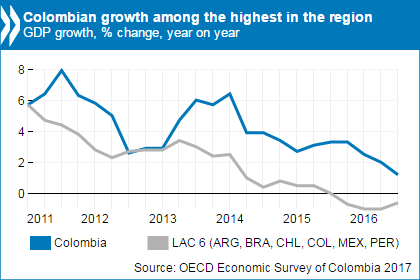Colombia: Raise productivity and make growth more inclusive
The Colombian economy has been more resilient than other Latin American countries to the recent fall in commodities prices, and remains among the strongest in the region. The latest OECD Economic Survey of Colombia finds that while important reforms and current economic policies have helped the country adapt to external shocks, more can be done to boost productivity, improve the business environment and make growth more inclusive.

The Survey, presented in Bogota by OECD Director of Country Studies Alvaro Pereira and Colombia’s Minister of Finance Mauricio Cardenas, projects GDP will grow by 2.2% in 2017 and 3% in 2018. It identifies priority areas for future action, including reforms to strengthen the quality of education, reduce informality and increase work opportunities for women.
“Thanks to bold reforms and a solid macroeconomic framework, Colombia has been extremely resilient to external headwinds as the commodities boom ended,” Mr Pereira said. “The challenge going forward is to deliver higher incomes and well-being for all Colombians. The peace agreement will certainly boost economic growth and job creation. However, in order to make growth more inclusive, Colombia must also achieve better educational outcomes, bring more people into the formal economy, invest in infrastructure for the future and reduce barriers to competition.”
The Survey says that continuing implementation of the 2016 tax reform will help the economy adjust to lower oil prices and reduce budgetary dependence on oil revenues. Raising higher levels of revenue should also help address inequality, by increasing the scope for progressive redistributive policies. Further lowering tax burdens on investment and wages can sustain greater formal employment and new infrastructure projects, the Survey said.
The Survey also recommends a range of reforms to boost inclusion, social mobility and living standards. These include further simplifying procedures for company registration and the affiliation of workers to social security, improving active labour market programmes, expanding early childhood education and raising the quality of education and training programmes.
Greater and more affordable child, elderly and disability care would open the job market to more women. Better job opportunities in poorer regions and higher public investment to improve infrastructure and lower costs of trade are required. Greater competition in some sectors - such as rail, electricity and roads – and simplifying legal procedures would support private investment and move Colombia toward greater productivity and inclusion, the Survey said.
Source: Organization for Economic Co-operation and Development
- 306 reads
Human Rights
Fostering a More Humane World: The 28th Eurasian Economic Summi

Conscience, Hope, and Action: Keys to Global Peace and Sustainability

Ringing FOWPAL’s Peace Bell for the World:Nobel Peace Prize Laureates’ Visions and Actions

Protecting the World’s Cultural Diversity for a Sustainable Future

Puppet Show I International Friendship Day 2020

